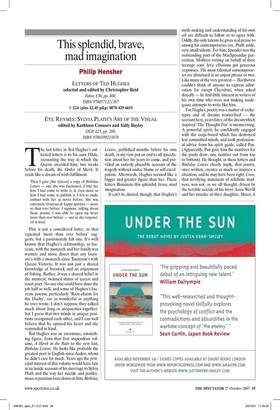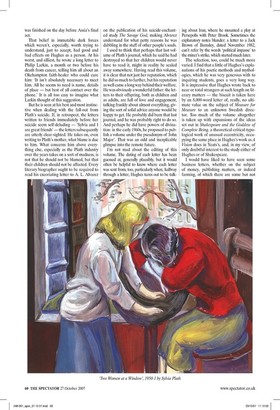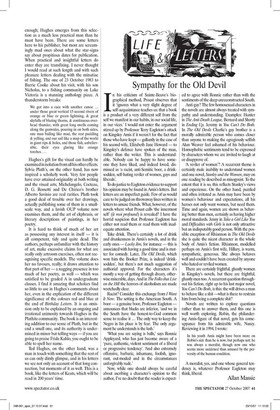This splendid, brave, mad imagination
Philip Hensher LETTERS OF TED HUGHES selected and edited by Christopher Reid Faber, £30, pp. 800, ISBN 9780571221387 £24 (plus £2.45 p&p) 0870 429 6655 EYE RHYMES: SYLVIA PLATH'S ART OF THE VISUAL edited by Kathleen Connors and Sally Bayley OUP £25, pp. 269, ISBN 9780199233878 The last letter in Ted Hughes's collected letters is to his aunt Hilda, recounting the way in which the Queen awarded him, two weeks before his death, the Order of Merit. It reads like a dream of wish-fulfilment: Then I gave [the Queen] a copy of Birthday Letters — and she was fascinated. I told her how I had come to write it, & even more so how I had come to publish it. I felt to make contact with her as never before. She was extremely vivacious & happy-spirited — more so than ever before. I suppose, talking about those poems, I was able to open my heart more than ever before — and so she responded in kind.
This is not a considered letter, as that repeated 'more than ever before' suggests, but a passionately felt one. It's well known that Hughes's relationship, as laureate, with the monarch and her family was warmer and more direct than any laureate's with a monarch since Tennyson's with Queen Victoria. It was not just a shared knowledge of livestock and an enjoyment of fishing. Rather, it was a shared belief in the mystical, twinned status of queen and court poet. No one else could have done the job half as well, and some of Hughes's laureate poems, particularly 'Rain-charm for the Duchy', are as wonderful as anything he ever wrote. I don't suppose they talked much about Jung or anapaestics together: but I guess that two minds in unique positions recognised each other, and I can well believe that he opened his heart and she responded in kind.
Ted Hughes was an enormous, astonishing figure, from that first stupendous volume, A Hawk in the Rain to the very last, Birthday Letters. He looks like probably the greatest poet in English since Auden, whom he didn't care for much. Years ago the principal interest of this volume would have lain in an inside account of his marriage to Sylvia Plath and the way her suicide and posthumous reputation bore down on him Birthday Letters, published months before his own death, in my view put an end to all speculation about her for years to come, and provided an entirely plausible account of the tragedy without undue blame or self-exculpation. Afterwards, Hughes seemed like a bigger and greater figure than her. These letters illuminate this splendid, brave, mad imagination.
It can't be denied, though, that Hughes's myth-making and understanding of his own art are difficult to follow or to agree with. Oddly, the only talents he gives real praise to among his contemporaries are, Plath aside, very small talents. For him, Spender was the outstanding poet of the MacSpaunday generation. Mothers writing on behalf of their teenage sons' lyric effusions got generous responses. His most talented contemporaries are dismissed in an unjust phrase or two. Like many of the very greatest — Beethoven couldn't think of anyone to express admiration for except Cherubini, when asked directly — he had little interest in writers of his own time who were not making inadequate attempts to write like him For Hughes, poetry was a matter of archetypes and of dreams transcribed — the account here, years later, of the dream which inspired 'The Thought-Fox' is mesmerising. A powerful spirit, he confidently engaged with the ouija-board which has destroyed less committed minds, and took professional advice from his spirit guide, called Pan. (Apparently, Pan gave him the numbers for the pools draw, one number out from top to bottom). He thought, as these letters and Birthday Letters clearly imply, that poetry, once written, creates as much as inspires a situation, and he may have been right. Crow, that terrifying statement of nihilistic madness, was not, as we all thought, driven by the terrible suicide of his lover Assia Wevill and her murder of their daughter, Shura; it was finished on the day before Assia's final act.
That belief in immutable dark forces which weren't, especially, worth trying to understand, just to accept, had good and bad effects on Hughes as a person. At his worst, and silliest, he wrote a long letter to Philip Larkin, a month or two before his death from cancer, telling him all about an Okehampton faith-healer who could cure him. 'It isn't absolutely necessary to meet him All he seems to need is name, details of place — but best of all contact over the phone.' It is all too easy to imagine what Larkin thought of this suggestion.
But he is seen at his best and most instinctive when dealing with the fall-out from Plath's suicide. If, in retrospect, the letters written to friends immediately before her suicide seem self-deluding — 'Sylvia and I are great friends' — the letters subsequently are utterly clear-sighted. He takes on, even writing to Plath's mother, what blame is due to him What concerns him above everything else, especially as the Plath industry over the years takes on a sort of madness, is not that he should not be blamed, but that their children should not be affected. Every literary biographer ought to be required to read his excoriating letter to A. L. Alvarez on the publication of his suicide-enchanted study The Savage God, making Alvarez understand for what petty reasons he was dabbling in the stuff of other people's souls.
I used to think that perhaps that last volume of Plath's journal, which he said he had destroyed so that her children would never have to read it, might in reality be sealed away somewhere. Having read this volume, it is clear that not just her reputation, which he did so much to further, but his reputation as well came a long way behind their welfare. He was obviously a wonderful father: the letters to their offspring, both as children and as adults, are full of love and engagement, talking frankly about almost everything, giving the sort of solid advice anyone would be happy to get. He probably did burn that last journal, and he was probably right to do so. And perhaps he did have powers of divination: in the early 1960s, he proposed to publish a volume under the pseudonym of 'John Major'. That was an odd and inexplicable glimpse into the remote future.
I'm not mad about the editing of this volume. The dating of each letter has been guessed at, generally plausibly, but it would often be helpful to know where each letter was sent from, too, particularly when, halfway through a letter, Hughes turns out to be talking about Iran, where he mounted a play at Persepolis with Peter Brook. Sometimes the explanatory notes blunder: a letter to a Jack Brown of Barnsley, dated November 1982, can't refer by the words 'political impasse' to the miner's strike, which started much later.
The selection, too, could be much more varied. I find that a little of Hughes's explanations of his poetic methods and mythologies, which he was very generous with to inquiring students, goes a very long way. It is impressive that Hughes wrote back to near or total strangers at such length on literary matters — the biscuit is taken here by an 8,000-word letter of, really, no ultimate value on the subject of Measure for Measure to an unknown Swedish director. Too much of the volume altogether is taken up with expansions of the ideas set out in Shakespeare and the Goddess of Complete Being, a theoretical-critical-typological work of unusual eccentricity, occupying the same place in Hughes's work asA Vision does in Yeats's, and, in my view, of only doubtful interest to the study either of Hughes or of Shakespeare.
I would have liked to have seen some business letters, whether on the subject of money, publishing matters, or indeed farming, of which there are some but not enough; Hughes emerges from this selection as a much less practical man than he must have been. There are some letters here to his publisher, but most are screamingly mad ones about what the star-signs say about propitious dates for publication. When practical and insightful letters do enter they are transfixing. I never thought I would read at such length and with such pleasure letters dealing with the minutiae of fishing. The one of 23 October 1983 to Barrie Cooke about his visit, with his son Nicholas, to a fishing community on Lake Victoria is a stunning anthology piece. A thunderstorm breaks: We got into a race with another canoe ... under those great vertical 15-second rivers of orange or blue or green lightning, & great skyfulls of blazing thorns, & continuous overhead thunder, with great long swells coming along the gunwales, pouring in on both sides, one man bailing like mad, the rest paddling & yelling, and our sail like a map of the world in giant rips & holes, and those fish, unbelievable, their eyes glaring like orange torches ...
Hughes's gift for the visual can hardly be examined in isolation from all his other effects. Sylvia Plath's, on the other hand, has now inspired a scholarly work. Very few people have ever attained originality at both writing and the visual arts; Michelangelo, Cocteau, D. G. Rossetti and De Chirico's brother Alberto Savinio are real rarities. Plath took a good deal of trouble over her drawings, actually publishing some of them in a smallscale way, and a lavish OUP volume now examines them, and the art of ekphrasis, or literary descriptions of paintings, in her poetry.
It is hard to think of much of her art as possessing any interest in itself — it is all competent, tidy and quite dead. The authors, perhaps unfamiliar with the history of art, make excessive claims for what are really only artroom exercises, often not recognising specific models. The volume does her no favours, really; it draws attention to that part of her — a nagging presence in too much of her poetry, as well — which was satisfied to be graded A in undergraduate classes. I find it amazing that scholars find so little to use in Hughes's comments about her, even in the explication of the different significance of the colours red and blue at the end of Birthday Letters. It is an omission only to be explained by an ongoing and irrational animosity towards Hughes in the Plathite community. The book is an interesting addition to our sense of Plath, but in the end a small one, and its authority is undermined in minor but telling ways — if you are going to praise Frida Kahlo, you ought to be able to spell her name.
Ted Hughes, on the other hand, was a man in touch with something that the rest of us can only dimly glimpse, and in his letters we see not only an account of that long connection, but moments of it as well. This is a book, like the letters of Keats, which will be read in 200 years' time.




































































 Previous page
Previous page